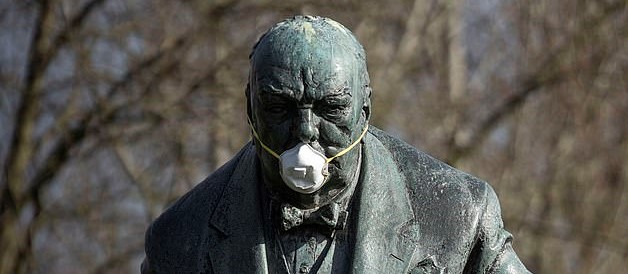We Will Never Surrender
On Monday afternoon, the stock market responded to news that an experimental vaccine had successfully produced an antibody response in the first six individuals to receive it as part of a phase 1 clinical trial. One day later, the market dropped precipitously in its closing moments on news that it was too early for this particular vaccine candidate to be declared successful. It was a whip-saw reaction that feels particularly apt in this moment. We’re all so eager to get back to normal that we leap at unvetted news from a corporation about a product it’s developing with the determination of a drowning person reaching for a life-saver.
I get it. We all want this thing to be over. We want our lives back. We want our jobs back. We want to see our friends and our families. We want the virus to just disappear.
But as my sister likes to say, “Wanting ain’t getting.” And hope is not a strategy.
The closest historical analogy I’ve been able to come up with is “war weariness.” There are countless examples throughout history when a people grew tired of the sacrifice and the hardships of continued combat. It’s a problem for any society engaged in war, no matter how they are governed, but it’s especially dangerous in democracies where public support is essential to the legitimacy and ultimately the success of the war effort. Once people no longer support a war, a democracy won’t long be able to fight that war.
That was the moment facing the British Empire eighty years ago this month, in May of 1940, after the British Army had to be evacuated from Dunkirk. Having suffered a great defeat on the continent, British politics split between those who favored accommodation with Germany and those around Winston Churchill who believed they should fight.
Despite the recent Hollywood portrayal of Churchill taking inspiration from the tenacity of the British people, make no mistake it was Churchill’s leadership that steeled British resolve and steadied a nervous nation. It was Churchill’s bombast and bravado, his precise understanding of what was at stake, and his ability to communicate determination and to find martial valor in unqualified disaster that sustained the British war effort through the war’s darkest hours.
That is what great leaders do. They don’t simply win elections. They stand for things greater than themselves, greater than any one of us. They call us together. They inspire our confidence, and they make us believe that we can prevail in the face of great peril even at the expense of great sacrifice.
Today we face an adversary in the form of COVID-19, and after three months, we are all tired of living this way. We would rather go out without face masks. We would rather be able to hug our parents or grab a beer with our friends. We want to be able to dine in restaurants, get our hair cut, and just get back to normal.
That spirit, that sentiment is as old as humanity and it manifests itself anytime we face grave dangers like war and disease.
But history teaches us that we don’t always pick the timing of our wars, and we don’t ever pick the timing of pandemics—not when they start, and certainly not when they will end.
And if our fight, in this moment, lacks a Churchill to guide us through dark days or replace our war weariness with resolve, then we can write our own history in the countless acts of individual Americans led by science and compassion to wear masks, to social distance, and to look out for the most vulnerable among us.

